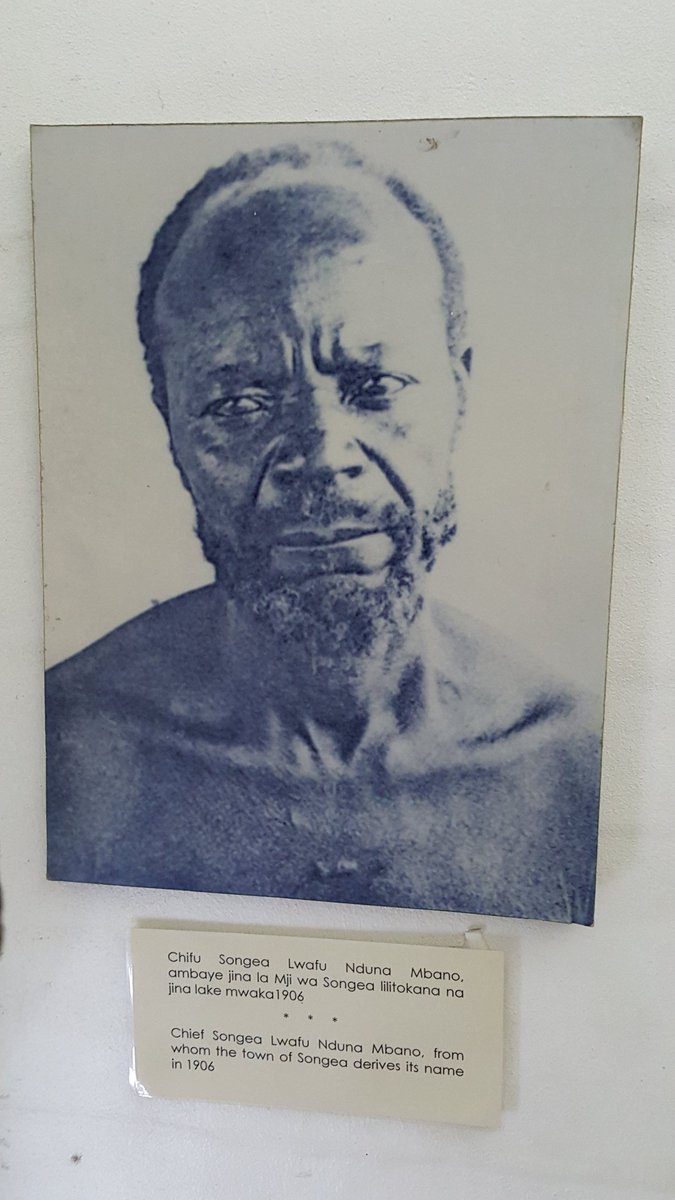Naona ukumbi umepoa.
Yuko aliyesema ana maswali kuhusu Nyerere anataka kuniuliza.
Kapotea sijamsikia.
Yuko aliyekuja na mpya kuwa Waislam sio walioanza harakati dhidi
ya ukoloni akataja Maji Maji.
Nikaweka jibu.
Hakuridhika akadai kuwa majibu nimejinukuu mwenyewe kwa hiyo
ni ajua.

Chief Songea Mbano
Nikaja na jibu kutola nyaraka za Wajerumani wenyewe waliopigana
na Chief Abdul Rauf bin Songea.
Najua kapata mshtuko kwa kuwa hajapatapo kumsikia Chief Abdul
Rauf bin Songea katika Vita Vya Maji Maji ingawa inawezekana kuwa
kasikia Chief Songea Mbano.
Najua ametatazika kama wengi wanavyotatazika hivi sasa wakinisoma.
Hawa ni watu wawili au ni mtu mmoja?
Abdul Rauf bin Songea ndiyo huyu Songea Mbano?
Kuchakachua historia kuna hatari zake na hii ni mojawapo.
Hakuwa anajua kuwa Vita Vya Maji Maji Waislam walisimama dhidi ya
Wajerumani.
Majemadari 60 Waislam walinyongwa na kuzikwa kaburi moja Mahenge,
Songea na kumbukumbu ya iko hapo kwenye kumbukumbu ya Maji Maji
Songea.
Katika kaburi la peke yake amezikwa Songea Mbano.
Je huyu ndiye yule Abdul Rauf bin Songea?
Kuna mahali Abdul Rauf bin Songea anaitwa kwa jina la ''Chief Songea
Luwafu Mbano.''
Soma hapo chini:
One of these is Chief Songea Luwafu Mbano, from whom the town takes its name


Hii ''Lwafu,'' ndiyo Rauf?
Huyo hapo juu kwenye picha ndiye Chief Abdul Rauf Songea Mbano
Jemadari Muislam wa Vita Vya Maji Maji.
Angalia hapo chini ghafla majina ya hawa Waislam hayaonekani badala
yake kuna majina mengine lakini ni ya wale wale Waislam walionyongwa:

Angalia hapo chini ghafla majina ya hawa Waislam hayaonekani badala
yake kuna majina mengine lakini ni ya wale wale Waislam walionyongwa:

Nani huyu anaepotosha haya majina mazuri ya Waislam katika historia
ya Maji Maji?
Sasa soma hapo chini:
Sasa soma hapo chini:
Islam
has always been the ideology of resistance against colonial rule or any other
authority which tried to subjugate Muslims. Consequently, no government in
power either indigenous or foreign has ever been kind or supportive to Islam,
and likewise Muslims have always been engaged in a continuous struggle to
preserve their faith and fight for their rights. Christianity was resisted by
Muslims right from the beginning. In any uprising against the colonial
government, Muslims took the opportunity to attack missionaries and Christian
establishments. Muslim perceived both missionaries and the colonial
government as fellow collaborators and therefore enemies to Islam. Islamic
radicalism has therefore a long history in the struggle against colonial rule
and Christianity. Christianity became a reactionary force siding with the
colonial authority. One needs only to read the letter written by the Chief
Songea bin Ruuf at the time when he was mobilising his people for war while
at the same time trying to cement alliances with other chiefs in Southern
Tanganyika and across the River Ruvuma in Mozambique. This letter
written to Sheikh and Sultan Mataka
bin Hamin Massaninga reads:
|
''Sultan
Songea bin Ruuf writes: To the Shaykh and Sultan Mataka bin Hamis Massaninga.
Greetings, etc. I am sending you a letter through Kazembe. We have received
an order from God that the Europeans must leave the country. We are in the
process of fighting them here. I believe that we have long since been
reconciled,[so] send me your children, so that we may make an alliance. I had
wanted to send you some cattle as a gift, but am not able to do so, as the war which God desired is continuing. Send me a hundred riflemen, and support me in storming the Boma (Songea).
|
I
am also sending you a flask of the Prophet Muhammad, which contains the means
for conquering the Europeans. Have no doubt about it, it possessed great
power. And when we have taken the Boma (Songea), we shall go on the stations
on the Nyasa together, you and I. Now,
let us forget our old quarrels.
|
This
bottle, with a da’wa, has been sent by Chinyalanyala himself, the war leader.
He also sends the container (kombe), and sends you many greetings.
|
If your men will come, then Chinyalanyala
himself will come and will give you many of the holy things.
|
Hassan bin Isma’il greets you.
|
Many salutations,
|
Sultan Songea bin Ruuf.” [1]
|
A
point to note here is that this letter, beautiful as it is, it is being
doubted by Becker, who maintains that the origins of the letter are dubious.[2]
This is the stand which many Christian researchers have taken when faced with
the realities of Islam in Tanganyika.
|
Rauf bin Songea kayataja katika barua yake.
Angalia neno ''bin'' katika baadhi ya majina kisha jiulize na wapi likawekwa neno ''bin,'' kwa
asiyekuwa Muislam.

Kaburi la Chief Abdul Rauf Songea Mbano katika Maonyesho ya Taifa ya Maji Maji
Mahenge, Songea ambae kazikwa kwa jina la Songea Mbano.
Kutoka: Mohamed Said, "The Life and Times of Abdulwahid Sykes (1924 - 1968) The Untold Story of The Muslim Struggle Against British Colonialism in Tangnayika, Minerva Press, London 1998."[/TD]
[/TR]
[/TABLE]
Sultan Songea bin Ruuf huyu hapo juu ndiyo huyu anayoelezwa tena hapa chini kama Chief
Songea Mbano?:
"Anasema hali hiyo ilitokea kwa sababu Chifu Songea Mbano alikuwa ndiyo Jemedari Mkuu wa Jeshi la Wangoni na alikuwa ni hodari sana asiyeogopa lolote kwa hiyo Wajerumani walitaka abakie ili wamtumie kwa malengo yao.
"Yeye Chifu Songea alidai na yeye anyongwe kama walivyonyongwa ndugu zake, basi alinyongwa na Wajerumani ambao waliondoka na kichwa chake wakiwa wamekiweka ndani ya kasha kwenda Ujerumani ambako hakijarudi hadi leo na kiwiliwili chake kuzikwa katika kaburi la peke yake."(Kutoka:http://www.jamiiforums.com/habari-na-hoja-mchanganyiko/64754-historia-ya-vita-vya-majimaji.html)
WanajamviNaamini mnaiona tofauti iliyopo.
Au hawa ni machifu wawili tofauti?
Nani anahusika na uchakachuaji huu wa majina haya ya Kiislam katika historia ya Vita Vya Maji Maji?



No comments:
Post a Comment